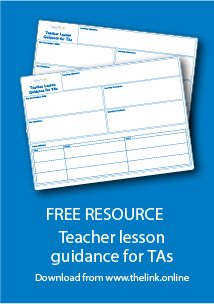Guidance on making the best use of TAs by Jo Chessum.
I have had the privilege of sharing my classroom with some of the most creative, insightful and (dare I say … ) effective Teaching Assistants. I doubt that I am alone when I found the research evidencing that ‘pupils receiving the most support make the least progress’ somewhat upsetting. Don’t get me wrong… I am all too aware of the variable knowledge, skills and experience that TAs can have; and yes, I have had to work hard at times to create a culture that promotes independent learning with TAs who genuinely ‘just want to help’. Yet I can honestly say that the progress of the pupils I have taught has undoubtedly been the result of a team effort.
‘Don’t Blame TAs’
So I breathed a sigh of relief when reading the recently published guidance on ‘Making the Best Use of Teaching Assistants’. The report suggests that the negative impact, of additional support on pupil’s progress, is a result of issues relating to whole school practice rather that the fault of TAs themselves. In what has become a direct, pedagogical role, TAs are consistently allocated to work with the lowest attaining pupils, to have no time to plan, prepare and feedback with the teacher and to have limited access to appropriate training. The research suggests that it is decisions made about TAs, not by TAs, that best explains their impact on pupil progress. The guidance outlines points Senior Leaders need to consider in reviewing their deployment of TAs.
To find out more about how TAs can effectively support language development in the classroom visit The Link Online.
Recommendations for improving the IMPACT of TAs
I – Provide INTERVENTIONS with clear planning, resources and expected outcomes.
M – MAKE LINKS between intervention work and classroom based learning.
P – PREPARE TAs for the content of lessons, what they need to know and what they need to do.
A – ASK for feedback about the progress of children against intended learning outcomes.
C – CHANGE classroom practice so the TAs are not always supporting the lower attaining pupils.
T – Provide TRAINING in delivering interventions AND pedagogical classroom practice.

FREE RESOURCE: Teacher lesson guidance for TAs – download from The Link Online.
Please login to view this content
Login